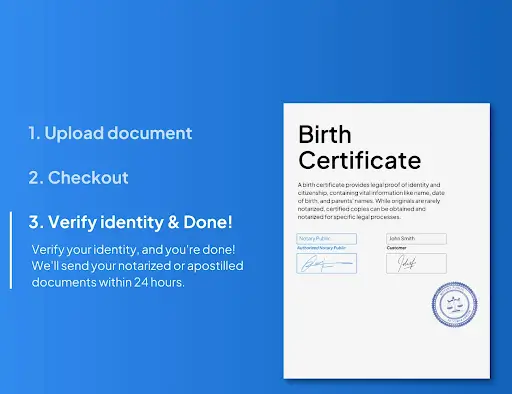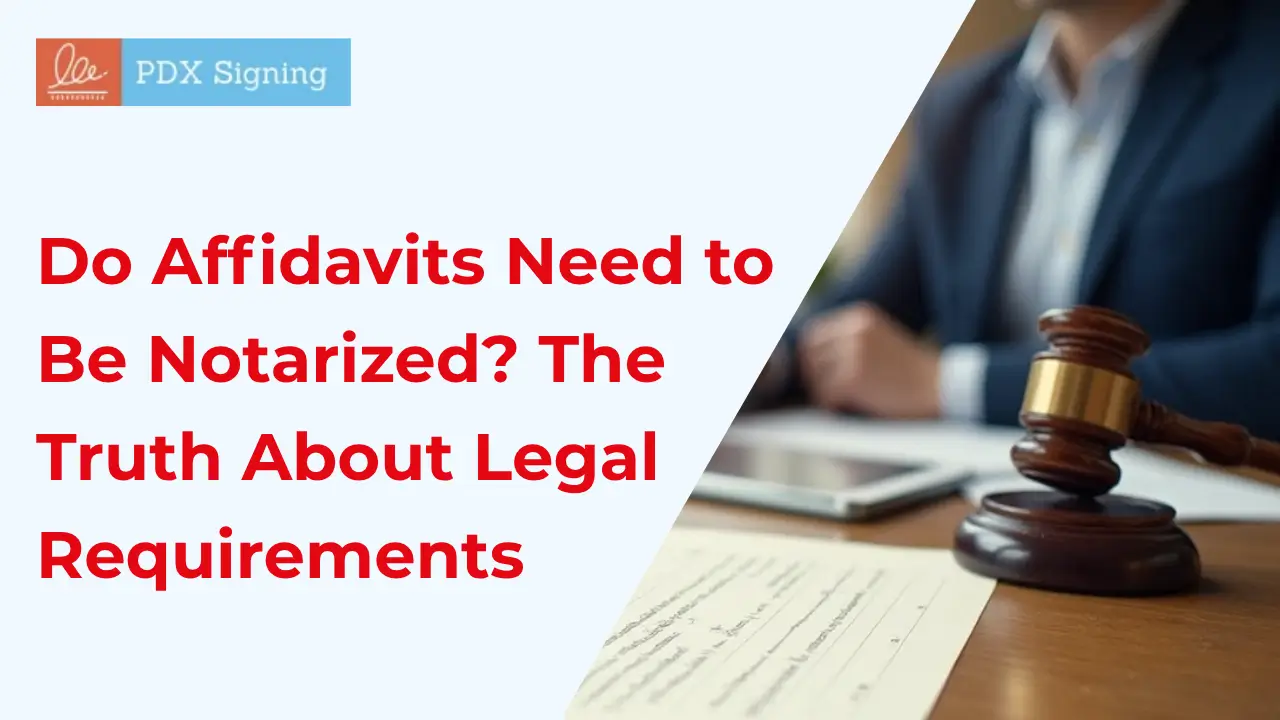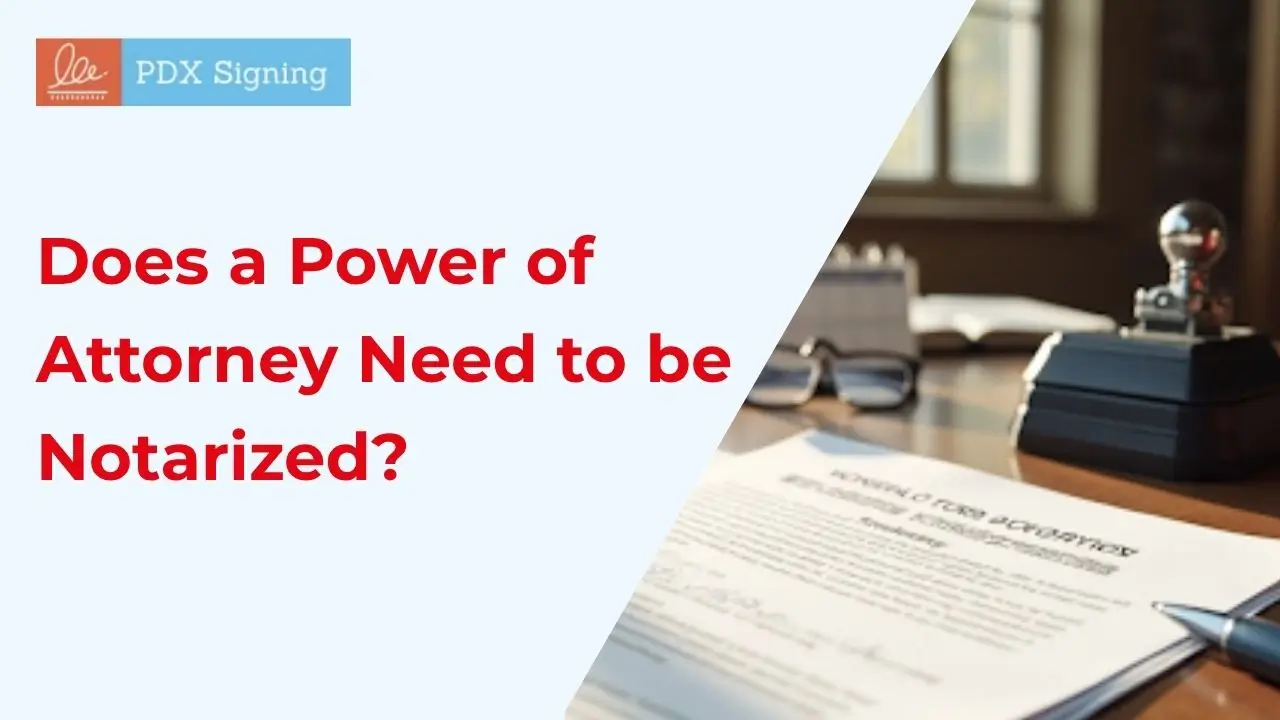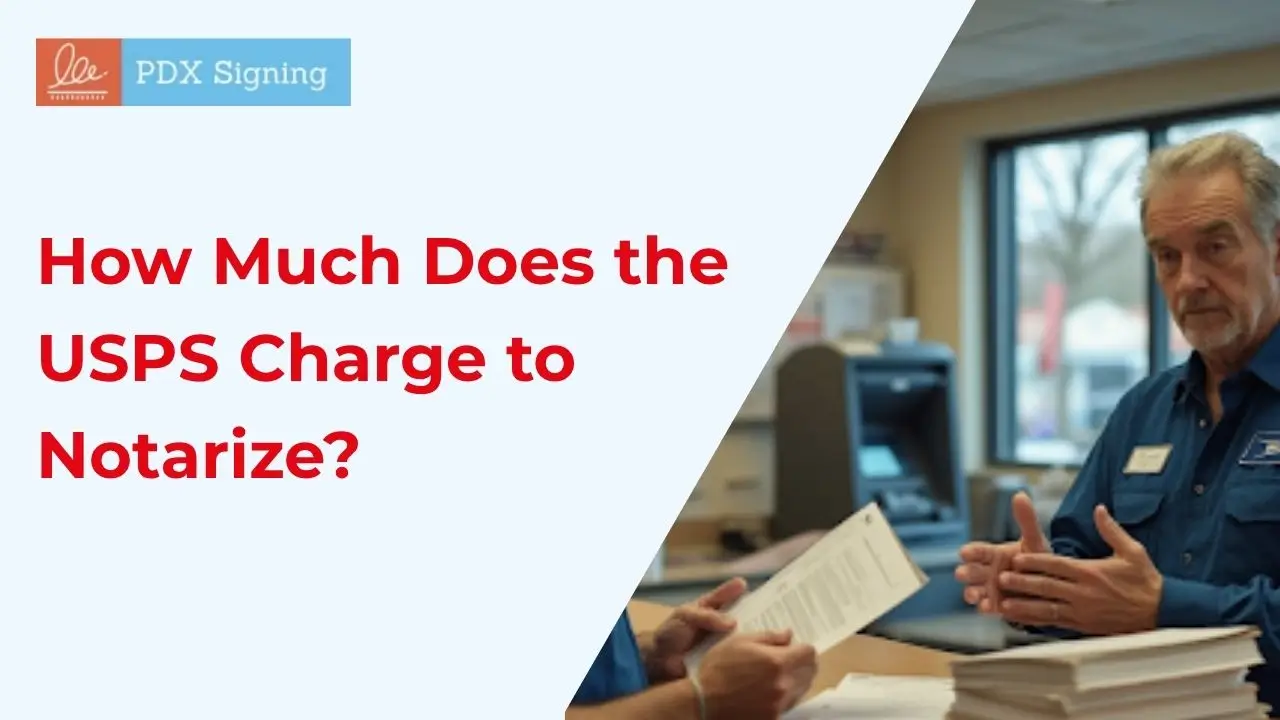People often ask: Can you notarize a birth certificate? The answer is straightforward – you can’t. A common misconception exists, but notaries don’t have the authority to make certified copies of birth certificates, regardless of the state or country that issued the original document.
Birth certificates, death certificates, and marriage certificates are vital records that need special protection. The vital records agency office must keep the original document in its files. This situation creates confusion among people who need their birth certificates notarized or want to know about notarization options. The reality remains that nobody can notarize these documents – not in the way most people expect.
This piece explains the true meaning of a notarized birth certificate and why notaries can’t certify these vital records. You’ll discover the available alternatives and learn how to get a long-form birth certificate. DC residents will find specific information about ordering birth certificates online, though access remains limited to eligible people. The information here will help you handle any requests for birth certificates and notarization correctly. PDX Signing brings fast, professional, and mobile notary services right to your door—whether it’s your home, office, or a coffee shop.
What is a notarized birth certificate?

A birth certificate documents a person’s birth time and location. People often get confused about “notarized birth certificates” because notarization and birth certificates are typically incompatible. The confusion remains widespread and needs some explanation.
Definition and common misconceptions
The idea of a notarized birth certificate comes from wrong information. The cruise ship industry told travelers that a “notarized birth certificate” was enough to prove citizenship. This terminology doesn’t make sense because notaries can’t legally produce birth certificates. Birth certificates have special protection as vital records.
Many people think a notary’s stamp on a birth certificate copy makes it official. That’s not true. Birth certificates, death certificates, and marriage certificates can’t be notarized. Government agencies manage these vital records that contain important life event details.
Difference between the original and certified copy
What most people call their “original birth certificate” is a certified copy. The original birth record remains with a government agency, typically a health department or vital statistics office. This document never leaves official hands.
Government agencies give out certified copies when asked. These copies come with security features like watermarks, colored or embossed seals, and special ink that reacts to temperature. You can get these certified copies only if you meet certain requirements, like being named on the record.
Hospital souvenir birth certificates with baby footprints aren’t official and won’t work for legal purposes. Most hospitals don’t even keep birth records longer than seven years.
Why notarization is often misunderstood
People get confused about birth certificate notarization because they don’t know the difference between what government agencies and notaries can do. Notaries can’t certify birth certificate copies – they don’t have the legal power. Only government agencies with the original record can give out certified copies.
This rule exists with good reason, too. States limit who can ask for, make, and give out certified copies of vital records. These laws help stop fraud and identity theft. Notaries who try to make unauthorized copies might face serious consequences, including fines and jail time.
You might want to think over other options when you need to verify a birth certificate.
Can a notary notarize a birth certificate?
Notaries cannot notarize a birth certificate – the answer is a clear “no.” Notaries in the United States face strict limitations when dealing with birth certificates and other vital records.
Legal restrictions in the U.S.
American law prohibits notaries public from certifying copies of birth certificates. This rule exists because of basic document authentication and security principles. Cruise ship companies created confusion by telling travelers that a “notarized birth certificate” would work as citizenship proof. This misconception still exists today.
Birth certificates do not work as valid identification for notarization in many states. Your jurisdiction might not explicitly ban it, but a birth certificate misses key identification elements. It has no photo, signature, or current physical description.
Why notaries cannot certify vital records
Government agencies keep all original vital records permanently. Notaries must verify that copies match the original documents. They cannot certify documents without access to originals.
This restriction serves vital security purposes:
- Prevents identity theft and fraud
- Protects the integrity of official records
- Maintains proper revenue channels for government services
Notaries who try unauthorized certification of vital records face legal risks. To cite an instance, Connecticut imposes fines up to $150 or jail time up to one year. Wisconsin treats it as a Class I felony.
State-specific exceptions and rules
Each state has its specific regulations despite the nationwide ban:
Arkansas, Colorado, Connecticut, Florida, Kansas, Pennsylvania, and Texas explicitly ban notaries from certifying vital record copies. Colorado has an interesting rule – notaries can certify birth certificates from other states but not Colorado-issued ones.
California notaries have limited powers. They can only certify copies of powers of attorney or their journal entries when the Secretary of State or a court asks. New Mexico strictly forbids its notaries from photocopying birth, death, or marriage certificates.
Certified copies must come from authorized government agencies directly.
What to do if notarization is requested
You can’t notarize a birth certificate directly, but some related documents need notarization. Understanding these differences helps guide you through situations where official birth records need verification.
In some cases, notarization may still be required for related documents.
Documents related to birth certificates need notarization in specific circumstances. Credential evaluation services, universities, consulates, courts, and some government agencies might ask for notarized translations of birth certificates. Some foreign countries just need extra authentication beyond certification. If you’re unsure about requirements, check with the receiving organization since standards differ by institution and purpose.
Notarizing a request form for a birth certificate
Birth certificates can’t be notarized, but forms requesting them often can be. Several states allow notarization of signatures on applications for birth certificates. Ohio’s Affidavit Correction of Birth Record needs notarization, while its standard Application for Certified Copies doesn’t. Florida asks for a notarized affidavit to authorize another person to receive your birth certificate, and both parties must provide valid photo identification.
Using a document custodian affidavit
The “Copy Certification by Document Custodian” offers another solution. This process works as follows:
- The document holder makes a copy of their birth certificate
- They prepare an affidavit stating the copy is true and correct
- The notary notarizes this affidavit with a jurat
Most official agencies don’t accept birth certificate copies authenticated this way. Government-issued certified copies remain the standard requirement for official purposes.
How to notarize a translated birth certificate
For foreign birth certificates that need translation:
- A qualified translator (not the notary) must translate the document
- The translator creates a certification statement about their competency and translation accuracy
- A notary then notarizes the translator’s signature on this statement
Note that notaries can’t certify translations—this counts as unauthorized practice. Texas requires translated real property documents to be sworn before a notary for recording. USCIS doesn’t require notarization for translations, just a signed Certificate of Translation Accuracy.
How to get a certified copy of a birth certificate
Getting certified copies of birth certificates requires specific procedures that are 20 years old in the jurisdiction. Many people think a notary stamp on a copy works, but that’s not true.
How to order a DC birth certificate online
The District of Columbia Health Department suggests using VitalChek to order birth certificates. VitalChek is their only authorized online provider. You’ll pay $23.00 per certificate plus a $15.95 processing fee. Your birth certificate should arrive in 5-7 business days. New parents should know that they need to request birth certificates separately for newborns.
How to get a long-form birth certificate
Long-form birth certificates have more details than standard ones. These documents are great for international needs like dual citizenship or apostille certification. New York gives you two options – short and long forms. The long form has extra details like the time of birth. Los Angeles issues long-form certificates to anyone born in the county.
In-person and mail options
You can get same-day service by visiting vital records offices. Washington, DC, has self-service kiosks that check your identity and give you documents in 30-45 minutes. Mail service costs less but takes longer. Austin, Texas, takes 2-3 weeks, while Illinois needs up to 12 weeks.
Mail applications need:
- Completed application form
- Payment (check or money order)
- Copy of valid identification
- Self-addressed stamped envelope
Required documents and ID
You need at least one government-issued photo ID in most places. Primary IDs that work include:
- Driver’s license
- State ID card
- Passport
- Military ID
People without a primary ID can use other document combinations. Texas lets you use two secondary IDs (like a Social Security card or Medicare card) or one secondary with two supporting documents (utility bills, bank statements). The rules say that only the person named, immediate family members, or legal representatives can ask for birth certificates.
The fees change based on location. California charges $32.00, DC asks for $23.00, and South Carolina’s rush service costs $17.00.
Conclusion
Many people get confused about birth certificates and notarization. Birth certificates can’t be notarized directly, contrary to popular belief. Government agencies keep these vital records and are the only ones who can issue certified copies.
Cruise lines and other organizations created this confusion. They wrongly told people that “notarized birth certificates” would work as valid ID. Regardless, this mix-up has caused real-life problems for people who need their documents verified.
You can get an official copy of your birth certificate only from the right government agency. This process might involve ordering online through approved services, going to vital records offices yourself, or sending applications by mail with your ID and payment.
Notaries can’t certify birth certificates, but they can verify related papers like translation certificates or document custodian affidavits. On top of that, it’s worth knowing that most official agencies won’t take these alternatives instead of government-issued certified copies.
You ended up needing to know the right steps and procedures in the vital records world. This knowledge applies whether you need a long-form birth certificate for international travel or a standard copy for domestic use. By doing this and being organized, you’ll get valid legal documents. This understanding helps you handle birth certificate verification confidently without trying impossible notarization requests. Don’t let paperwork slow you down. Whether you’re closing a loan or need general notary work, PDX Signing is just a call or click away.
FAQs
Q1. Can a notary public notarize my birth certificate?
No, notaries public cannot notarize birth certificates. Birth certificates are vital records that fall under special protection and can only be certified by the government agency that holds the original document.
Q2. How can I get an authenticated copy of my birth certificate?
To get an authenticated copy of your birth certificate, you need to request a certified copy from the vital records office in the state or jurisdiction where you were born. This can be done online, by mail, or in person.
Q3. What should I do if I’m asked for a notarized birth certificate?
If you’re asked for a notarized birth certificate, explain that birth certificates cannot be notarized. Instead, offer a certified copy from the appropriate government agency, which is the legally recognized equivalent.
Q4. Can a notary translate my birth certificate?
No, notaries cannot translate birth certificates. If you need a translated birth certificate, you must hire a qualified translator. The notary can then notarize the translator’s signature on the certification statement, but not the translation itself.
Q5. What’s the difference between a short form and a long form birth certificate?
A short form birth certificate contains basic information, while a long form birth certificate includes more detailed information, such as parents’ names and birthplaces. Long-form certificates are often required for international purposes like dual citizenship applications.






